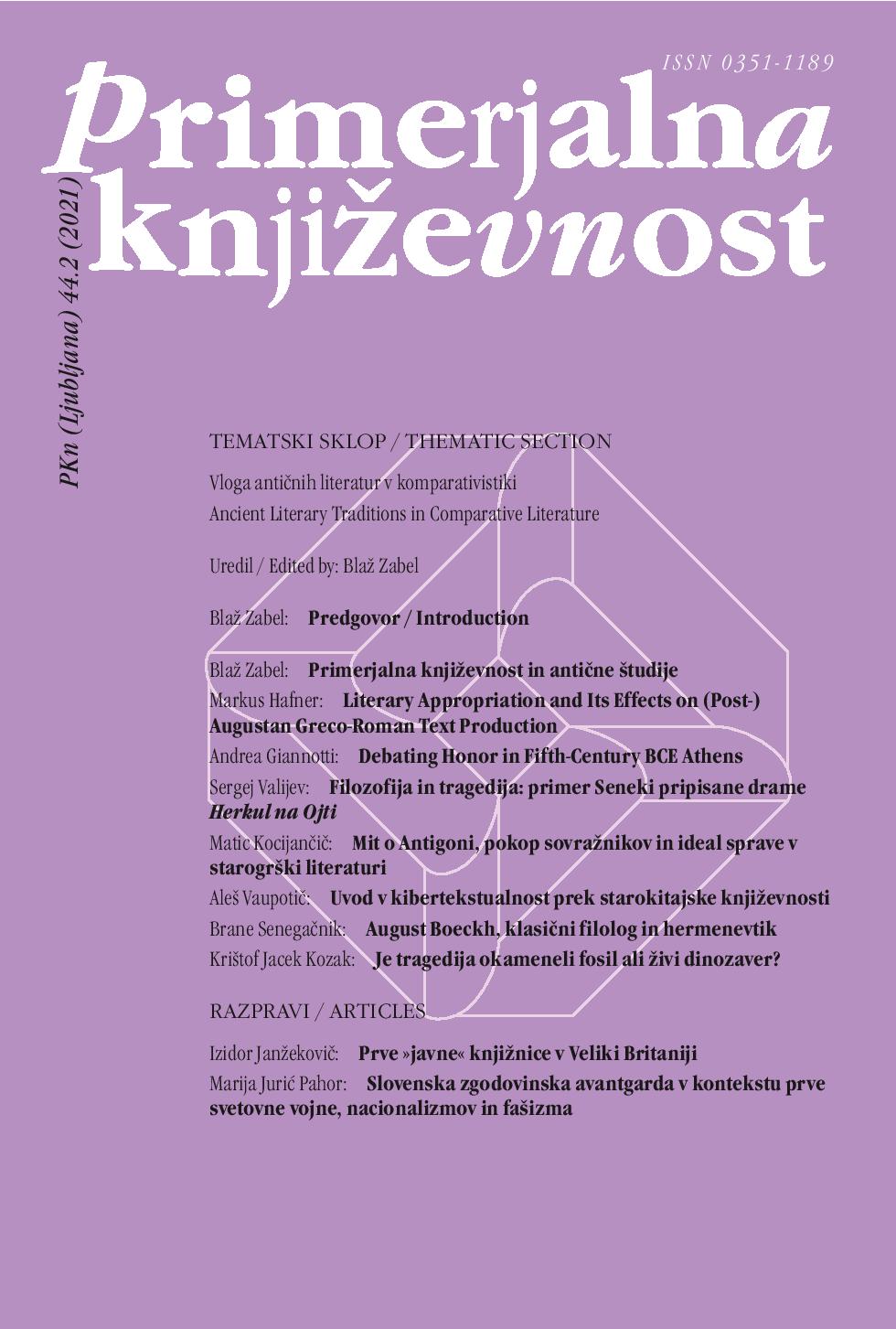Truly Bewept, Full of Strife: The Myth of Antigone, the Burial of Enemies, and the Ideal of Reconciliation in Ancient Greek Literature
DOI:
https://doi.org/10.3986/pkn.v44.i2.05Keywords:
ancient Greek literature, literary myths, Antigone, Homer, Aeschylus, Sophocles, EuripidesAbstract
Over the past five decades, the myth of Antigone has been the subject of noted literary, literary-critical, dramatic, philosophical, and philological treatments in Slovenia, not least due to the influence of one of the most important Slovenian plays of the twentieth century, Dominik Smole’s Antigona. The rich Slovenian discussion of the myth has often dealt with its most famous formulation, the Antigone of Sophocles, but has paid less attention to the broader ancient context; the epic sources (the Iliad, Odyssey, Thebaid, and Oedipodea); the other tragic versions (Aeschylus’s Seven Against Thebes and his lost Eleusinians; Euripides’s Suppliants, Phoenician Women, and Antigone, of which only a few short fragments have been preserved); and the responses of late antiquity. This article analyses the basic features of this nearly thousand-year ancient tradition and shows how they connect in surprising ways—sometimes even more directly than Sophoclean tragedy does—with the main issues in the Slovenian reception: the question of burying the wartime (or postwar) dead and the ideal of reconciliation.
References
Aeschylus. <em>Seven Against Thebes</em>. Prev. Anthony Hecht in Helen H. Bacon. New York, NY; Oxford: Oxford University Press, 1973.
Ajshil. <em>Sedmerica proti Tebam</em>. Prev. Alojz Rebula. Maribor: Študentska založba Litera, 2005.
Allen, Archibald, ur. <em>The Fragments of Mimnermus. Text and Commentary</em>. Stuttgart: Franz Steiner Verlag, 1993.
Bacon, Helen H., in Anthony Hecht. »Introduction«. <em>Seven Against Thebes</em>. Aeschylus. Prev. Anthony Hecht in Helen H. Bacon. New York, NY; Oxford: Oxford University Press, 1973. 3–17.
Cairns, Douglas. <em>Sophocles: Antigone</em>. London: Bloomsbury, 2016.
Cingano, Ettore. »Oedipodea«. <em>The Greek Epic Cycle and its Ancient Reception</em>. Ur. Marco Fantuzzi in Christos Tsagalis. Cambridge: Cambridge University Press, 2015. 213–225.
Jensterle-Doležal, Alenka. <em>Mit o Antigoni v zahodno- in južnoslovanskih dramatikah sredi 20. stoletja</em>. Ljubljana: Slovenska matica, 2004.
Finglass, Patrick J. »Stesichorus, master of narrative«. <em>Stesichorus in Context</em>. Ur. Patrick J. Finglass in Adrian Kelly. Cambridge: Cambridge University Press, 2015. 83–97.
Gantar, Kajetan. »Ajshil in njegova ‘drama polna Aresa’«. <em>Sedmerica proti Tebam</em>. Ajshil. Prev. Alojz Rebula. Maribor: Študentska založba Litera, 2005. 5–17.
Homer. <em>Iliada</em>. Prev. Anton Sovrè. Ljubljana: Državna založba Slovenije, 1950.
Homer. <em>Odiseja</em>. Prev. Anton Sovrè. Ljubljana: ZSK, Založba Mihelač, 1991.
Hubbard, Thomas K. »History’s First Child Molester: Euripides’ Chrysippus and the Marginalization of Pederasty in Athenian Democratic Discourse«. <em>Bulletin of the Institute of Classical Studies</em> 78 (2006): 223–244.
Kaufmann, Walter. <em>Tragedy and Philosophy</em>. Princeton, NJ: Princeton University Press, 1992.
Kocijančič, Matic. <em>Mit o Antigoni v povojni slovenski književnosti, filozofiji in družbenopolitičnem diskurzu</em>. Doktorska disertacija. Ljubljana: Univerza v Ljubljani, Filozofska fakulteta, 2020.
Kocijančič, Matic. »‘Nič drugega kot nič’: negativna teopolitika Sofoklove <em>Antigone</em>«. <em>Primerjalna književnost</em> 44.1 (2021): 107–127.
Kovacs, David. »The Role of Apollo in Oedipus Tyrannus«. <em>The Play of Texts and Fragments</em>. Ur. J. R. C. Cousland in James R. Hume. Leiden: Brill, 2009. 357–368.
Kyriakou, Poulheria. <em>The Past in Aeschylus and Sophocles</em>. Berlin: de Gruyter, 2011.
Lamari, Anna A. »Phoenician Women«. <em>A Companion to Euripides</em>. Ur. Laura K. McClure. Chichester: John Wiley & Sons, 2017. 258–269.
Lloyd-Jones, Hugh. <em>The Justice of Zeus</em>. Berkeley, CA: University of California Press, 1973.
Miola, Robert S. »Early Modern Antigones: Receptions, Refractions, Replays«. <em>Classical Receptions Journal</em> 6.2 (2014): 221–244.
Pindar. <em>Slavospevi in izbrani fragmenti</em>. Prev. Brane Senegačnik. Ljubljana: Družina, 2013.
Pindar. »II. olimpijska oda«. Prev. Jan Ciglenečki. <em>Literatura</em> 21.211/212 (2009): 207–214.
Plutarch. <em>Parallel Lives. Volume I. Theseus and Romulus. Lycurgus and Numa. Solon and Publicola (Loeb Classical Library L046)</em>. Prev. Bernadotte Perrin. Cambridge, MA: Harvard University Press, 1967.
Scodel, Ruth. »Sophocles’ Biography«. <em>A Companion to Sophocles</em>. Ur. Kirk Ormand. Hoboken: Wiley-Blackwell, 2012. 25–37.
Sommerstein, Alan H. »Tragedy and the Epic Cycle«. <em>The Greek Epic Cycle and its Ancient Reception</em>. Ur. Marco Fantuzzi in Christos Tsagalis. Cambridge: Cambridge University Press, 2015. 461–486.
Torres-Guerra, José B. »Thebaid«. <em>The Greek Epic Cycle and its Ancient Reception</em>. Ur. Marco Fantuzzi in Christos Tsagalis. Cambridge: Cambridge University Press, 2015. 226–243.
West, Martin L., ur. <em>Greek Epic Fragments (Loeb Classical Library L497)</em>. Cambridge, MA: Harvard University Press, 2003.
Zimmermann, Christiane. <em>Der Antigone-Mythos in der antiken Literatur und Kunst</em>. Tübingen: Gunter Narr Verlag, 1993.


